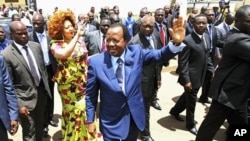Cameroon's President Paul Biya starts his 30th year in office this week.
November 6, 1982.
If you were alive then, think about where you were and all you have done since. Every one of those days Paul Biya has been president of Cameroon.
He starts another seven-year term this week with political opponents condemning his re-election as fraudulent, much as they have claimed in every vote since the first multi-party contest in 1992.
CPDM
Political analyst Abgor Ambang says President Biya's longevity is partly the result of the strength of his ruling Cameroon People's Democratic Movement (CPDM) party.
“When you compare the preponderance of the CPDM in the field and their looming political and financial capacity and a very, very coercive party going to compete with a divided and lethargic opposition, it was an asymmetric struggle," Ambang said. "From there I think it was easy for us to actually foresee the victory of the CPDM.”
Ambang believes a candidate fielded by a unified opposition could have threatened President Biya this year. But like past elections, they came together only after the race was lost.
“At the time we expected the opposition parties to come together they did not," noted Ambang. "The stand at this point can only be moral solidarity. It is actually destitute of any serious commitment. I mean what is the raison d’être [reason for] of coming together when they failed to do this at the vital moment? And again, calling about the cancellation of results, enough grounds have not actually been advanced to justify such a decision."
Election observers
U.S. observers reported irregularities in the vote but say they did not affect the overall outcome. Former colonial power France urged authorities to correct problems before legislative elections in March.
Several relative newcomers to presidential politics finished ahead of veteran candidates. Ambang says that further undercut the opposition challenge to results as politicians are less likely to questions vote totals that show their support growing.
Jean de Dieu Momo is one such politician. He placed eighth, besting several more-experienced candidates. Momo says there was “a lot of fraud” but he doesn't think its a problem.
“We are satisfied because those frauds have not really changed my place in the group," Momo said. "I am number eight. And this is a very good place to jump the next time because now, an unknown personality, now they know that they can count on me. They can not do anything without me now. We are there.”
Opposition leader John Fru Ndi finished second, again, with 10 percent of the vote - his lowest share ever. His party's vice chairman, Joshua Osih, says the president's political opponents will come back stronger after learning from what went wrong this year.
“You need only a minimum of political goodwill to turn Cameroon around," Osih said. "And at the time we were going in for this election we believed, wrongfully, that this minimum goodwill would be around to make the election acceptable. But this didn't happen.”
Opposition criticized
Government spokesman, Issa Tchiroma Bakary, says President Biya's opponents continue to fail because they do not deliver in promises.
“They made a commitment: 'We are ready. We accept the rule of the game and at the end of the day we are ready to accept the verdict as it will be pronounced by the Supreme Court.' This is what they said. And now they refuse it and want the government to enter into negotiations with those people. Why?” asked Bakary.
Opposition leaders have failed to rally much public protest against the outcome. Douala voter Maureen Ndi says there is no appetite for a fight.
“I’m not ready to join in any protests. I believe that the happenings in other countries like Ivory Coast, Egypt and Libya are too fresh in our memories," Ndi said. "If it has to happen here, it is going to be terrible. We have never experienced war. Cameroonians are suffering, but we want peace.”
Demonstrations have been discouraged by post-electoral troop deployments. Xavier Messe is a columnist with the daily Le Quotidien Mutations.
Messe says the Biya government gains nothing in spreading what he calls a “psychosis of war” in Cameroon. He says this notion of fear is not normal. When fear lives inside you, you are completely destabilized. No one has anything to gain through violence, but Messe says, ruling party supporters continue to spread this fear.
President Biya is kicking off his sixth term with a series of large public works projects in energy, mining, ports, and agriculture that he says will make Cameroon an emerging market economy by 2035. With the elimination of presidential term limits three years ago, Mr. Biya is eligible for re-election in 2018.
